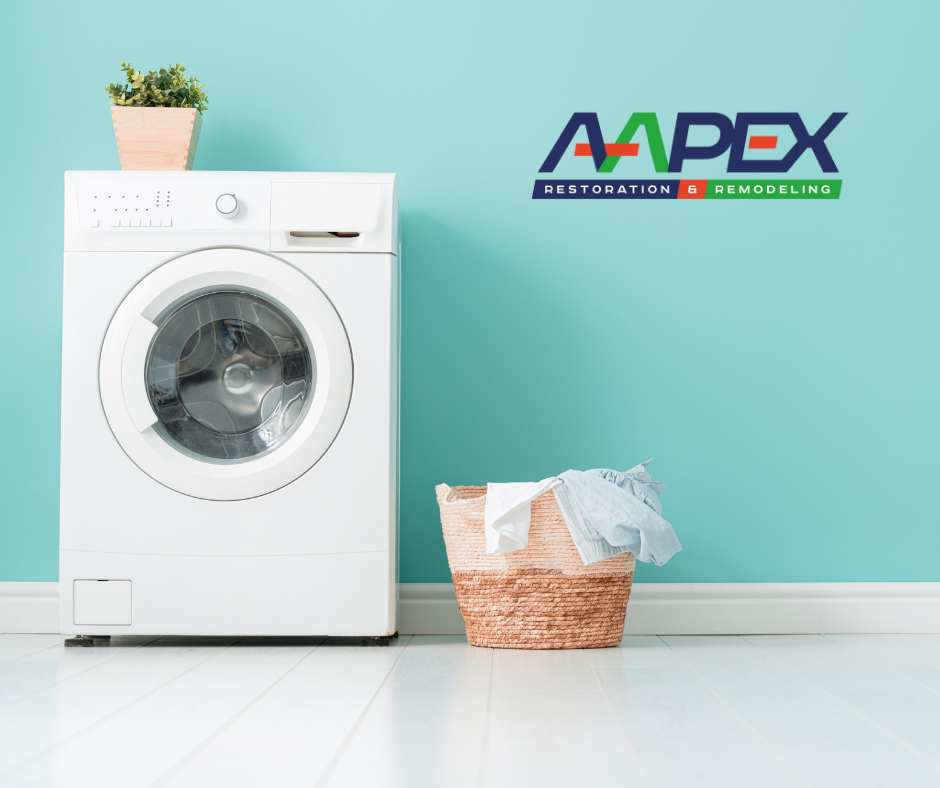Dealing with appliance failure is bad enough without adding in the headache of the water damage that sometimes comes with it. When appliances fail, they tend to fail big, spilling gallons of water across the floor or secretly dripping into unseen puddles. Equally as important as tackling your appliance failure is cleaning up, drying out, and repairing any water damage that may have occurred. Keep an eye out for the damage some of these household appliances can cause when they fail and follow these tips for springing into action when they do.
The Potential Destruction of Appliance Leaks
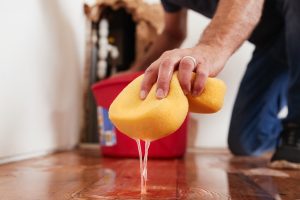
We depend on home appliances almost without even thinking about the potential harm they can cause if they fail. Unaddressed appliance leaks can lead to a world of problems, including mold growth, damage to carpet, flooring, and drywall, wood rot, and even significant structural issues. Knowing these common failures for some of our most relied upon appliances can help you catch appliance failures early on.
Washing Machines
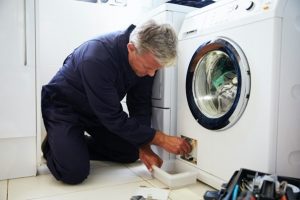 One of the most important and frequently used appliances in any family’s home, a washing machine failure can be one of the most devastating – and water heavy – appliance failures. Most HE washing machines today use anywhere from 7 to 13 gallons of water per load, a vast improvement over the 40 gallons older machines used. But even seven gallons, dumped out onto your laundry room floor, can cause significant damage if not tackled right away. Washing machines most often fail when their drain hose breaks, cracks, or becomes disconnected from the drainage pipe. Damaged seals, broken post gaskets, or even overloading the machine may also cause leaks during the washing cycle. Leaks from washing machines are typically big enough that you notice them right away. Sometimes, however, the drum may come off balance and minimal amounts of water may leak out during the rinse or spin cycles. As a precaution against this, we recommend placing your washing machine in a drain pan that will catch these minimal spills.
One of the most important and frequently used appliances in any family’s home, a washing machine failure can be one of the most devastating – and water heavy – appliance failures. Most HE washing machines today use anywhere from 7 to 13 gallons of water per load, a vast improvement over the 40 gallons older machines used. But even seven gallons, dumped out onto your laundry room floor, can cause significant damage if not tackled right away. Washing machines most often fail when their drain hose breaks, cracks, or becomes disconnected from the drainage pipe. Damaged seals, broken post gaskets, or even overloading the machine may also cause leaks during the washing cycle. Leaks from washing machines are typically big enough that you notice them right away. Sometimes, however, the drum may come off balance and minimal amounts of water may leak out during the rinse or spin cycles. As a precaution against this, we recommend placing your washing machine in a drain pan that will catch these minimal spills.
Dishwashers
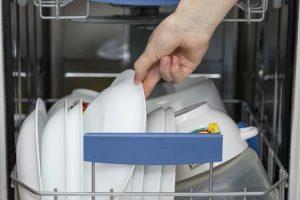 Dishwashers are among our favorite household appliance. We fill them up with dirty dishes, turn them on, and walk away and forget the hassle of “doing the dishes” after a meal. The problem with dishwashers is how easily we can forget about them. When dishwashers overflow, it is usually because they have been overfilled, there is a leak or break in one of the drainage hoses, or a pump has failed. Sudsy water running out the front of the machine and pooling on the floor is easy enough to notice. Breaks in drainage hoses that run behind or underneath the dishwasher, however, may go undetected. Check under your sink regularly for any sign of leakage. If you suspect your dishwasher may be leaking, remove the kick plate and check underneath the machine with a flashlight. Add cleaning your dishwasher filter to your regular machine maintenance to avoid preventable damage to your dishwasher pump.
Dishwashers are among our favorite household appliance. We fill them up with dirty dishes, turn them on, and walk away and forget the hassle of “doing the dishes” after a meal. The problem with dishwashers is how easily we can forget about them. When dishwashers overflow, it is usually because they have been overfilled, there is a leak or break in one of the drainage hoses, or a pump has failed. Sudsy water running out the front of the machine and pooling on the floor is easy enough to notice. Breaks in drainage hoses that run behind or underneath the dishwasher, however, may go undetected. Check under your sink regularly for any sign of leakage. If you suspect your dishwasher may be leaking, remove the kick plate and check underneath the machine with a flashlight. Add cleaning your dishwasher filter to your regular machine maintenance to avoid preventable damage to your dishwasher pump.
Refrigerators
 Refrigerator leaks often go undetected because they usually start out small and get mistaken for melted ice cubes that have fallen from the ice dispenser. Refrigerator leaks are most often caused by breaks in the water supply line running up the back of the fridge to the ice maker and water dispenser. They may start out slow and are particularly difficult to notice at first because they spray down the back of the refrigerator while there is no discernible change in water pressure in the dispenser. The water may not find its way to the front of the refrigerator until the leak has grown, and at that point, the floor underneath may have suffered substantial water damage. A cracked drain pan or clogged defrost drain are other common sources of a refrigerator leak. Because supply line breaks can be the source of a secret leak, we recommend periodically pulling out and cleaning behind your refrigerator, paying particular attention for any signs of water underneath.
Refrigerator leaks often go undetected because they usually start out small and get mistaken for melted ice cubes that have fallen from the ice dispenser. Refrigerator leaks are most often caused by breaks in the water supply line running up the back of the fridge to the ice maker and water dispenser. They may start out slow and are particularly difficult to notice at first because they spray down the back of the refrigerator while there is no discernible change in water pressure in the dispenser. The water may not find its way to the front of the refrigerator until the leak has grown, and at that point, the floor underneath may have suffered substantial water damage. A cracked drain pan or clogged defrost drain are other common sources of a refrigerator leak. Because supply line breaks can be the source of a secret leak, we recommend periodically pulling out and cleaning behind your refrigerator, paying particular attention for any signs of water underneath.
Water Heaters
Most household water heaters hold anywhere from 30 to 80 gallons of hot water, depending on the size of the home. Because these units are often tucked away in the basement, they are typically out of sight and out of mind until homeowners start noticing issues with their water temperature. A leaking water heater can mean disaster for your basement, particularly if it is finished. Caused by leaking values or inlet or outlet connections, minor leaks are relatively easy to fix. However, the most common cause of a leaking water heater – years of collected sediment corroding the bottom of the tank – is the most potentially harmful. Often these leaks begin small and quickly grow until the entire tank is spilling out onto the floor. If your water heater is tucked away in your basement, be sure to check on it periodically, more so if it is older, and address any leaks the moment you discover them.
What to Do if Your Appliance Fails
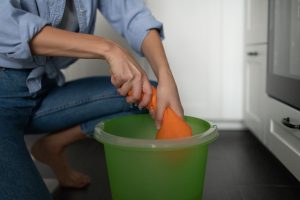 If you discover that your appliance has failed and is leaking water into your home, the first thing you need to do is stop the flow of water. This can be done, in most cases, by discontinuing use of the appliance or shutting of water valves feeding into the leak. The next step is to remove as much water as is possible from the flooded area to prevent damage to your home’s structure. Shop vacs, carpet cleaners, and even submersible pumps for really big appliance leaks can be used to get most of the water up. Follow with towels and then set up fans and dehumidifiers to dry the area as much as you can. If you were able to get the water up quickly and it was not a substantial enough amount of water to reach into the walls or soak into carpet, this may be enough to prevent water damage issues. Be sure to keep your fans and dehumidifier running for the next 3-5 days, until the area is completely dry. For more substantial appliance leaks or those that have gone undetected for any amount of time, professional help may be needed. You will want to assess whether there has been damage to the floors and walls and determine whether mold growth has set in.
If you discover that your appliance has failed and is leaking water into your home, the first thing you need to do is stop the flow of water. This can be done, in most cases, by discontinuing use of the appliance or shutting of water valves feeding into the leak. The next step is to remove as much water as is possible from the flooded area to prevent damage to your home’s structure. Shop vacs, carpet cleaners, and even submersible pumps for really big appliance leaks can be used to get most of the water up. Follow with towels and then set up fans and dehumidifiers to dry the area as much as you can. If you were able to get the water up quickly and it was not a substantial enough amount of water to reach into the walls or soak into carpet, this may be enough to prevent water damage issues. Be sure to keep your fans and dehumidifier running for the next 3-5 days, until the area is completely dry. For more substantial appliance leaks or those that have gone undetected for any amount of time, professional help may be needed. You will want to assess whether there has been damage to the floors and walls and determine whether mold growth has set in.
If you’re concerned your home may have sustained water damage due to an appliance failure, contact us to schedule a consultation today. We are a locally owned company with more than 20 years’ experience specializing in insurance and non-insurance restoration projects. We’ll help you determine whether your potential water damage may be covered by insurance and act as your advocate every step of the way.
Related Articles
Water in Your Basement: Sources and Solutions
9 Surprising Places Mold May Be Lurking in Your Home
The Importance of Proper Mold Remediation

